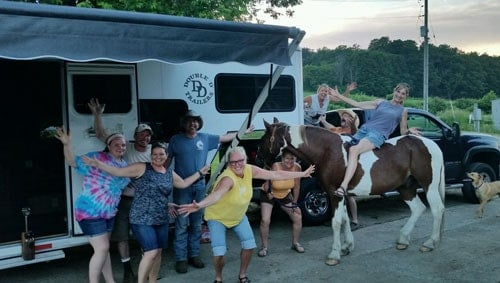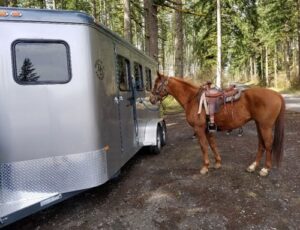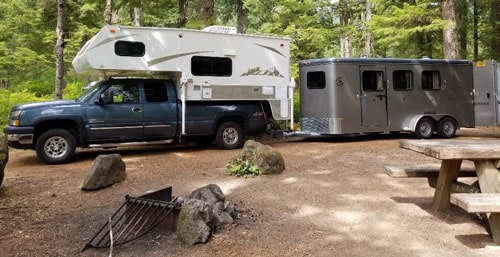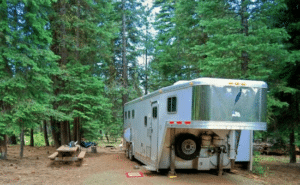The Horse Owners Complete Guide on Camping with Horses
Camping with horses offers a unique opportunity to explore the great outdoors with your equine companion. Whether you're an experienced horse owner or just starting out, camping with horses can provide a truly unforgettable experience. From breathtaking scenery to new trails to explore, there's no better way to bond with your horse and enjoy nature. However, camping with horses requires careful planning and preparation to ensure a safe and enjoyable trip. In this article, we'll provide tips and advice for horse owners looking to embark on a camping adventure with their four-legged friend.
Plus, browse the state by state directory of horse-friendly campsites!

Getting Prepared: Make a Packing List
One of the most important things when it comes to an enjoyable camping trip with your horses is making sure that you are prepared and organized. While what you and your horses need might be different from others, here is a list of basic things that horse owners should pack when they go camping with horses:
-
Food and water for your horse.
-
Tack and equipment.
-
First-aid kit for your horse. Learn everything that you need in a travel horse first aid kit
-
Camping gear for yourself. (This will vary depending on if you’re planning on sleeping in your horse trailer.)
-
Firewood and a fire starter.
-
A map and compass. (Or, GPS on your phone if you have a signal at the campsite.)
-
A flashlight and extra batteries.
-
A first-aid kit for yourself.
-
Sunscreen, insect repellent, and a hat.
-
A sense of adventure… and maybe stuff for s’mores. 🙂
Download the Extensive Double D Trailers Packing List
Get Your Horse Trailer Ready for the Trip
When traveling with your horses anywhere, preparing your horse trailer for the trip is a big step in ensuring a safe and comfortable experience for both you and your horse. The three most important things to do before heading out for your camping venture are to check, clean, and pack the trailer.
Check the Condition of Your Trailer: Before the trip, check the overall condition of your horse trailer including the tires, brakes, lights, and hitch. Make sure that everything is in good working order.
Clean the Trailer: Make sure that your horse trailer is cleaned thoroughly inside and out. This will help keep the trailer comfortable for both you and your horses to use during the camping trip. Read more: How to clean a horse trailer
Pack Adequate Trailer Supplies: Pack adequate supplies for your horse including feed, water (or make sure that the campsite has a water source), bedding, and first aid supplies. Ensure that these supplies are stored safely and securely.
Batteries, Tanks and Generators
Now this next tip on horse trailer camping preparation certainly depends on how much your plan to ‘rough’ it during your trip. Some people consider camping a purely rustic adventure with fire cooked meals, and open air sleeping quarters. Others prefer to have an air-conditioned retreat with running water and refrigerated beverages.
If you belong to the first group of adventurous souls, then you can disregard this tip. For the rest of us, here’s what you need to know about batteries, tanks, and generators.
In a living quarters horse trailer, most of your amenities will function using a 12V battery or your stored propane tanks. This includes the hot water heater, refrigerator, cook top, water pump, and interior lighting. Make sure your battery is charged and your tank is full. You should be good to go.
If you plan on using air conditioning and television during your rustic vacation, then you will need to step things up a notch and find an electricity generator. These items require a 110 V electrical source and would quickly drain your on-board battery. A solar panel is another option if you prefer to avoid a noisy generator (assuming you are parked in a sunny spot.)
A good generator can be tricky to find. Brad shared, “If using a generator I always recommend RV generators as they are much quieter and fuel efficient than say a ‘Briggs and Stratton" from Lowe’s or Home Depot.” RV generators do cost a lot more, but they are well worth their dollars.
Remember that many organized campsites have a noise policy after 9:00 PM, so you would be required to shut down a loud model generator. Brad shared a solution, “One of my favorite portable generators for camping is the Honda EU3000IS Super Quiet. You simply can't go wrong with those!”
A final note on tanks for your rig…remember that your sewage tank is not like Mary Poppin’s magical bag. It is not endless and will need to be emptied eventually. Don’t forget to make a quick stop at the truck stop or RV dump station to empty your tank after a camping trip.
Arriving at the Campsite
First things first… parking! Once you reach your camping destination, you are going to want to situate your rig in a safe parking location so that you can use the trailer all weekend. Look for a location on level ground without any hazards like tree limbs or banks that could endanger your horses. Avoid low hanging branches that would rest on the top of the trailer because wet leaves can stain your roof over time.
Consider buying a lock for your hitch if you plan to spend all day away from the trailer. Finally, position the electrical hook-ups for your hitch so that the plug is hanging down. This way, rainwater doesn’t collect in the female plug component and cause damage.
Unhitching the Horse Trailer
What happens if you arrive at your camping location and need to use the truck separately? It is important that you understand when it is and isn’t safe to unhitch your trailer if you plan to continue using it while the truck is away.
The good news…if you have a gooseneck trailer, you should be able to safely load or unload your horses from an unhitched trailer. This can be handy if you have a large trailer where the horses can use the interior as a stall during a long day of showing.
The bad news… If you have a bumper pull trailer, it is not always safe to unhitch your trailer for continued use. Brad Heath, owner and chief designer at Double D Trailers cautioned, “On a bumper pull, it depends on the locations of the axles and empty tongue weight. It’s possible to have negative tongue weight so that the front end of the trailer can rise up.”
For example, if the empty tongue weight on a trailer is only 400 lbs and you put more than 400 lbs on the back end of the trailer, then your trailer has suddenly turned into a see-saw and the front end is going to start rising off of the ground!
Chocking Your Trailer
Chocking your trailer correctly is an important step to make sure your trailer doesn’t slowly roll away in the middle of your weekend. Make sure you always have at least one wheel chock for your trailer. Two is ideal. Brad personally likes just using standard wheel chocks.
He laughed, “We use these at our loading docks with eighteen-wheelers for loading and unloading freights. If it will hold those heavy trucks with forklifts hauling thousands of pounds in and out, it's safe for a horse trailer!”
Unloading Your Horses
The best way to ensure that your horses are safely unloaded on your camping trip is to practice loading and unloading your horse before the trip. This will help reduce stress and ensure that your horse is comfortable with the process.
Learn about how to load and unload anxious horses.
Keeping Your Horses Safe and Comfortable While Camping

-
Choose a safe campsite. The campsite should be level, free of hazards, and well-drained. It should also be located away from busy roads and trails.
-
Inspect your horse before and after riding. Before and after each ride, be sure to inspect your horse for any signs of injury or illness. If you see any signs of trouble, seek veterinary care immediately.
-
Be aware of your surroundings. When riding your horse, be aware of your surroundings and be on the lookout for potential hazards. Be especially careful when riding in areas with heavy traffic or near cliffs or other dangerous terrain.
-
Bring a first-aid kit. It is always a good idea to bring a first-aid kit with you when camping with horses. This will help you to treat any minor injuries that may occur.
-
Know your horse's limits. Do not push your horse beyond its limits. If your horse is tired or stressed, stop riding and give it a break.
- Be prepared for the weather. Before you go camping, be sure to check the weather forecast and pack accordingly. If you are camping in cold weather, be sure to pack warm clothes and blankets for you and your horse. If you are camping in hot weather, be sure to pack plenty of water and shade for you and your horse.
Where to Go Camping with Horses: Directory of Horse-Friendly Campsites in the United States
If you’re not sure where you want to take your horses on your next camping adventure, check out the top-rated equestrian campgrounds state by state.
Alabama - Warden Station Horse Camp
Alaska - Tanana Valley Campground
Arizona - Hay Creek Ranch
Arkansas - Saddle Valley Ranch
California - Horse Flats Campground
Colorado - Coal Mesa Horse Camp
Connecticut - Silvermine Horse Campsite
Delaware - Blackbird State Forest
Florida - Highlands Hammock State Park
Georgia - Campground at Grove River Ranch
Hawaii - Pala'au State Park
Idaho - Cowboy Campground
Illinois - Shawnee Forest Campground
Indiana - Hoosier National Forest
Iowa - Nine Eagles State Park
Kansas - Eisenhower State Park
Kentucky - Dale Hollow State Park
Louisiana - Bogue Chitto State Park
Maine - Freeport / Durham KOA
Maryland - Assateague Island
Massachusetts - West Hill Dam
Michigan - Big Oaks Equestrian State Forest
Minnesota - Reno Horse Campground
Mississippi - Fords Well Equestrian Park
Missouri - Pomme de Ridge
Montana - Rock Creek Horse Campground
Nebraska - Nebraska National Forest at Chadron
Nevada - Guadalupe’s Campground
New Hampshire - Tippicanoe Campground
New Jersey - Brendan T. Byrne State Park
New Mexico - Wolf Hollow Campground
New York - Frontier Town Campground
North Carolina - Canebrake Horse Camp
North Dakota - Parkhurst Campground
Ohio - Beaver Creek State Park
Oklahoma - Bear Creek Trail
Oregon - Joe Graham Horse Camp
Pennsylvania - Kelly Pines
Rhode Island - George Washington State Campground
South Carolina - Croft State Park
South Dakota - Custer State Park
Tennessee - Timber Ridge
Texas - Caddo/LBJ National Grasslands
Utah - Tasha Equestrian Campground
Vermont - Camp Plymouth State Park
Virginia - Iron Mountain Horse Camp
Washington - Green Mountain
West Virginia - Pipestem Resort State Park
Wisconsin - Kettle Moraine State Park
Wyoming - Battle Park
Camping with your horses can be a lot of fun. It can also be a lot to manage, so make sure you use these tips to ensure you have a safe and enjoyable time. Happy trails!



